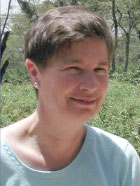Nairobi We had been failing to connect the entire time I was in Nairobi. Messages left at either my hotel desk or the reception at the Methodist Center were near misses as we ran to meetings, or she was out in the country. Kate Atkins, my international right hand, who has been helping me put together funds and focus for the international work on a brief assignment, had somehow found Cheryl Broetje in the miracle of the wide world web and thought there might be a fit between her work and ACORN’s interest. But, at the same time all Kate could really tell me was that Cheryl was connected to orchards in Washington State and much of their interest was faith based.
In the cooling rain that was closing out the season here in Nairobi we finally were set to rendezvous. She and a colleague were way late, having been caught in a “jam” as they call it here, when referring to the endless traffic on the rough roads, so we had little time before we needed to run to meet with the Church World Service.
We had an excellent conversation that was somewhat surprising perhaps to both of us. As we were preparing to put down our coffee cups and run, I asked her how she got into this work. The story was amazing and went roughly like this….
She and her husband, Ralph, were trying to develop orchards and were having a rough time of it in the 60’s after they were married. Apples were finally coming along, but they had some 40-50 acres of cherries where they were making no headway. After three years when the cherry orchard bore no fruit, her husband suggested that they might not have an alternative but to plow them under and move to apples. They happen to read a Bible story about a similar problem with figs that bore no fruit for three years, but then after that fallow period, as almost a test of faith, produced. Cheryl and Ralph took that as good advice and decided to give the cherries one more year. About the same time they were visiting in southern Mexico and saw an orphanage down there. Taken by the work, they promised the orphanage that though the cherry orchard had never produced anything, if it did, they would donate the any profit from the harvest to the orphanage. They warned that it was unlikely to yield a dime, but regardless, made the pledge. In the 4th year, the cherry orchard was wildly productive! After expenses the harvest produced $400,000 USD, which the Broetjes then true to their word gave 100% to the orphanage in Oaxaca, which allowed them to construct a new building.
From that point on the cherry yield — first fruit, they call the brand, I thought she said — became something that would be given away. Even with 1000 workers on the orchards (still mostly apple!), they organized committees of their almost exclusively Latino workforce to advise on where the yield should be spent each year. Not surprisingly, given the number of workers from Mexico, many of these projects have been there, but from what Cheryl said others have been in the Philippines, Kenya, and other developing countries. Cheryl offered to take the work of ACORN International “if I would share my reflections” to the workers’ committees and see whether they would support us here and elsewhere.
Mark Splain and I ran out into the rain moments later, but it wasn’t 5 minutes later before I looked over the back seat of the taxi to him, and said flatly, “If there are saints among us, damned if we didn’t just meet one!” We were floating on air, but I bet that is something that happens regularly to Cheryl Broetje!
